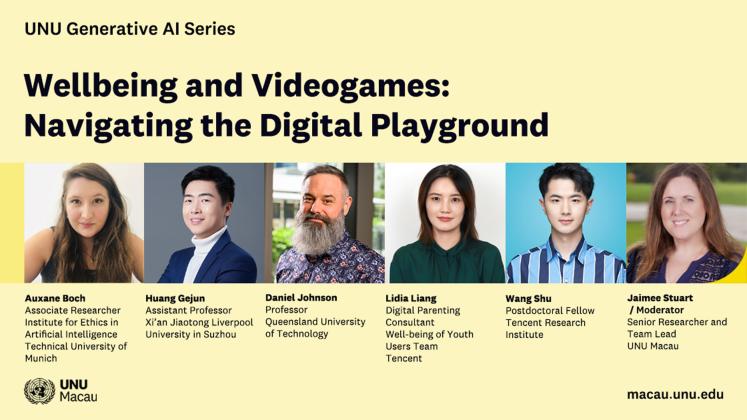On September 13, 2024, UNU Macau organized the webinar, Wellbeing and Videogames: Navigating the Digital Playground in collaboration with Tencent. The webinar hosted a moderated panel discussion from 5 eminent researchers and practitioners: Dr Huang Gejun, Lidia Liang, Dr. Wang Shu, Professor Daniel Johnson, and Auxane Boch, who offered their expertise on addressing the opportunities and tensions of playing video games for children, families and young people.
Play is a central part of the human experience that is widely known to provide critical developmental opportunities in the childhood years. Research highlights that play has deep meanings and meets critical needs beyond entertainment, providing opportunities for learning, psychosocial development, emotion regulation, self-expression, and for building a foundation of social norms[1],[2]. Critically, play continues to be important throughout the life course. For example, supporting young adults in meeting their identity needs[3], assisting adults in learning and professional development, as well as reducing cognitive decline and increasing social connection in older adults[4].
Yet, with increased access to technology and the growth of the video gaming industry (the global industry was worth over $184 billion in 2022 and is on the rise[5]), the nature of play has changed. More than a third of the global population are digital gamers, playing through their computers or laptops, gaming devices, and their smartphones. In this context, videogames have become a key source of play opportunities.
Harmonious passion - a deep interest in an activity that is personally important, freely chosen, and in harmony with the other aspects of a person’s life - for videogames can be healthy, especially when needs are being met in a person’s life in other ways as well.
As highlighted by Professor Daniel Johnson in his talk Videogames and Well-being, videogames satisfy the needs for competence, autonomy and connection, which increases wellbeing, and in turn motivates people to engage more with videogames. Professor Johnson suggests that harmonious passion - a deep interest in an activity that is personally important, freely chosen, and in harmony with the other aspects of a person’s life - for videogames can be healthy, especially when needs are being met in a person’s life in other ways as well. Professor Johnson also introduced his research with colleagues showing that videogaming can help with the management of difficult and stressful life events[6] and relates to increased cognitive activity among children[7].
Auxane Boch, in her talk The Good, the Bad and the not so Ugly about Video Games Impacts, also outlined the positive impacts of videogames on problem-solving, time management, and learning as well as social well-being. Specifically, she shared research that videogames activate brain areas related to attention skills[8], teamwork and the development of empathy and positive social interactions[9].
Auxane Boch also discussed the research on the downsides of gaming. Specifically, she noted that some videogames embed “dark patterns”, a term developed by Harry Brignull[10] to refer to the deceptive behaviour in websites or apps that lead one to do unintended things (e.g., loot boxes)[11]. She also mentioned issues such as the potential for toxic online behaviour and an over-emphasis on competitive play. Professor Johnson, however, cautioned against pathologizing videogame playing and outlined the arguments against the DSM-5 classification of Internet Gaming Disorder due to inconsistent evidence and ongoing debates on whether this is a unique disorder or a symptom of other causes, i.e., excessive videogaming as a coping mechanism.
Co-play, as a digital skill for parents, has the potential to be harnessed or developed in order to support better outcomes for all family members.
This issue was reiterated by Dr Huang Gejun, in his talk Does co-playing help? Digital gaming and digital parenting in Chinese families, where he discussed parents’ anxieties around gaming addiction. Dr Huang outlined key research being undertaken that shows co-playing among families may positively influence effective forms of digital parenting, and thus have the possibility of reducing the likelihood of negative impacts of videogaming for young people[12],[13]. In explaining his own research, Dr Huang found that parents who frequently co-play and those who enjoy co-playing with their children are less likely to overly restrict and monitor as digital parenting strategies. His work shows that co-play, as a digital skill for parents, has the potential to be harnessed or developed in order to support better outcomes for all family members.
The strong association between positive family contexts and videogaming was also outlined by Lidia Liang in her talk, The Relationship Between Family Education and Children's Attitudes and Behaviors toward Online Gaming. Lidia discussed the work of Tencent in supporting and guiding parents in a context where they may not have the tools or skills to support their children in unlocking the positive potential of videogaming. The program of work at the Tencent Minor Protection Center serves families to promote digital literacy, cybersecurity, and psychological safety and importantly to empower parents in raising children in a digital age. The Center has worked with a large number of families and their work indicates that increasing parental digital literacy can positively shape children’s understanding and responsible use of online games.
By lowering the threshold for content production and providing opportunities to engage with cutting-edge technologies, young people can contribute their creativity and be included as innovators.
Dr Wang Shu, in his talk Gametech and Its Positive Impact on Youth took a different, and very important, approach to the impacts of videogames, focusing on how innovative and advanced game technology, i.e, the Tencent Game Engine, can inspire among young to become involved in the design and development of videogames. By lowering the threshold for content production and providing opportunities to engage with cutting-edge technologies, young people can contribute their creativity and be included as innovators. This is further supported by initiatives such as the AI Talent Development Program and the AI National Open Competition where young people can build models within a gaming environment.
What you play and how much you play are not as important as who you play with and your experiences while playing.
This webinar brought together experts who highlighted distinct elements of the videogame ecosystem for young people: the satisfaction of needs and outcomes from playing video games, the family contexts and conditions that foster positive gaming experiences, and innovative ways to engage young people in video game design. As stated by Professor Johnson, “What you play and how much you play are not as important as who you play with and your experiences while playing”. Play continues to be important in our lives, and digital technologies are a means to achieve the affordances and outcomes of play. Therefore, we must continue to unpack the complexity that drives children, young people, and adults to participate in healthy and enriching forms of videogaming. This can help us better understand who is at risk of negative outcomes as well as to work toward responsible innovation in technology for children within the context of videogames in line with recommendations within the recent recommendations from UNICEF[14].
This webinar is also covered by Chinese media partners including China Youth Daily (https://go.unu.edu/U3xKy), China Daily (https://go.unu.edu/iUNme), and Global Times (https://go.unu.edu/fr6Ro).
[1] Burriss, K. G., & Tsao, L. L. (2002). Review of research: How much do we know about the importance of play in child development? Childhood Education, 78(4), 230-233. https://doi.org/10.1080/00094056.2002.10522188.
[2] Whitebread, D. (2018). Play: The new renaissance. International Journal of Play, 7(3), 237-243. https://doi.org/10.1080/21594937.2018.1532952
[3] Ito, M. (2013). Hanging out, messing around, and geeking out: Kids living and learning with new media (p. 440). The MIT press.
[4] Gaydos, M., & Kumar, V. (2024). Toward lifelong learning and play. Learning and Instruction, 93, 101940. https://doi.org/10.1016/j.learninstruc.2024.101940
[5] Arora, K. (2023). The Gaming Industry: A Behemoth With Unprecedented Global Reach. Forbes. https://www.forbes.com/councils/forbesagencycouncil/2023/11/17/the-gaming-industry-a-behemoth-with-unprecedented-global-reach/
[6] Formosa, J., Johnson, D., Türkay, S., & Mandryk, R. L. (2022). Need satisfaction, passion and wellbeing effects of videogame play prior to and during the COVID-19 pandemic. Computers in human behavior, 131, 107232. https://doi.org/10.1016/j.chb.2022.107232
[7] Klarkowski, M., Causse, M., Duprès, A., del Campo, N., Vella, K., & Johnson, D. (2022). Using fNIRS to Assess Cognitive Activity During Gameplay. Proceedings of the ACM on Human-Computer Interaction, 6. https://doi.org/10.1145/3549519
[8] Prena, K., Reed, A., Weaver, A. J., & Newman, S. D. (2018). Game mechanics matter: differences in video game conditions influence memory performance. Communication Research Reports, 35(3), 222-231. https://doi.org/10.1080/08824096.2018.1428545
[9] Lie, A., Stephen, A., Supit, L. R., Achmad, S., & Sutoyo, R. (2022, October). Using strategy video games to improve problem solving and communication skills: A systematic literature review. In 2022 4th International Conference on Cybernetics and Intelligent System (ICORIS) (pp. 1-5). IEEE. https://doi.org/10.1109/ICORIS56080.2022.10031539
[10] Brignull, H. (2023). Deceptive patterns: Exposing the tricks tech companies use to control you. Testimonium Ltd.
[11] Yi, W. (2024). Gaming the mind: Unmasking 'dark patterns' in video games. https://policyreview.info/articles/news/unmasking-dark-patterns-video-games/1739
[12] Ito, M., Baumer, S., Bittanti, M., Boyd, D., Cody, R., Herr-Stephenson, B., ... & Tripp, L. (2010). Hanging out, messing around, and geeking out. Cambridge, MA: MIT Press.
[13] Wang, B., Taylor, L., & Sun, Q. (2018). Families that play together stay together: Investigating family bonding through video games. New Media & Society, 20(11), 4074-4094. https://doi.org/10.1177/146144481876766
[14] UNICEF (2024). Responsible Innovation in Technology for Children Digital technology, play and child well-being https://www.unicef.org/innocenti/reports/responsible-innovation-technology-children
Suggested citation: Jaimee Stuart., "Wellbeing and Videogames: Navigating the Digital Playground," UNU Macau (blog), 2024-09-27, 2024, https://unu.edu/macau/blog-post/wellbeing-and-videogames-navigating-digital-playground.




